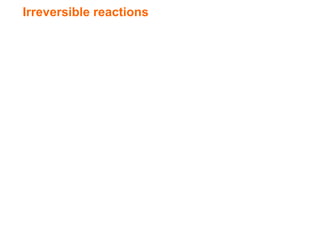The document discusses irreversible and reversible chemical reactions. It states that most chemical reactions are irreversible, meaning the products cannot be changed back into the original reactants. It provides examples like burning wood or magnesium reacting with hydrochloric acid. Reversible reactions are defined as those where the backward reaction occurs relatively easily under certain conditions, changing the products back into reactants. Biochemical reactions in organisms are often reversible as well, like oxygen binding to hemoglobin in the lungs and dissociating in tissues.









